Scotland worst in world for boys smoking cannabis - report

Nearly a quarter of boys aged 15 in Scotland said they had tried the class B drug
- Published
Fifteen-year-old boys in Scotland have the highest rate for smoking cannabis according to a new report from the World Health Organization (WHO).
The study, external found that nearly a quarter (23%) of boys aged 15 in Scotland surveyed said they had tried the Class B drug at some point.
In one of the largest studies of its kind the WHO examined data from 280,000 children aged 11, 13 and 15 from 44 countries around the world.
The survey also suggested that the UK has more of an issue with under-age vaping than many other countries.
The survey asked children living in Europe, Central Asia and Canada about their use of cigarettes, vapes, alcohol and cannabis.
It found that children in Scotland and Wales are more likely to have smoked cannabis than those in many other countries.
Both countries are in the top five globally.
From the Scottish sample, which involved 4,000 teenagers, 23% of 15-year-old boys said they had smoked cannabis within their lifetime, while 16% of girls the same age said the same.
Canadian girls ranked highest with 25% saying they had smoked the drug.
Just 13% of boys and 6% of girls in Scotland said they had used cannabis, also known as weed, in the last 30 days.
- Published16 April 2024
- Published29 January 2024
- Published19 June 2018
Dr Jo Inchley from the University of Glasgow, who worked as international co-ordinator for the study, said the high ranking of Scottish boys in the study is "concerning".
"We're not seeing the declines amongst regular users like we do amongst more experimental users," she said.
"Compared with other countries, we're still relatively high and 15-year-old boys in Scotland have the highest levels of cannabis use across the study as a whole.
"That's concerning. So, even though we've seen these decreases, we are still relatively high compared to other countries," she added.
Cannabis use has dropped in recent years and has stabilised, but some vulnerable children are still continuing to use it, according to Dr Inchley.
Almost 25% of 15-year-old boys in Scotland say they have smoked cannabis

The study also looked at trends in smoking, vaping and drinking alcohol among the three age groups.
It found two-fifths of girls in England and Scotland have vaped by the age of 15. That is higher than in other countries such as France, Austria, Germany, Albania, Spain, Canada and Norway.
The study found 40% of 15-year-old girls in Scotland, and 33% of boys have used an electronic cigarette.
Of those, 30% of girls said their use was in the 30 days prior to the 2022 survey, while for boys the figure was 20%.
"Vaping in the UK is higher than the average across all the countries that took part in the survey as a whole," said Dr Inchley.
“Steep increases in vaping among young people in the UK threaten to reverse some of the positive trends we’ve seen in substance use in recent years with overall declines in alcohol use and cigarette smoking since the 1990s," she said.
"Rates of vaping have doubled in the last four years among girls in Scotland.
"Vapes are far too readily accessible to young people and the health risks are underestimated. New legislation to ban single use vapes is an important step forward but further action is needed to address these worrying trends,” she added.
Vaping overtaken smoking
Smoking among children is must less common than it used to be - just one in five 15 year-old girls have ever smoked a cigarette - but smoking rates are still higher among girls than boys in England and Wales.
The report confirms that vaping rates have overtaken cigarette smoking in most countries, with nearly one in ten 11-year-olds saying they've used a vape at least once, rising to 26% of boys and 40% of girls by age 15.
Vaping rates in the UK are above average compared to other countries. Even though vaping is thought to be much less dangerous than smoking, the risks of children breathing chemicals into their lungs are not yet fully understood.
The UK government has already introduced measures to clamp down on the promotion and illegal sale of vapes to under 18s.

The study also looked at the number of teenagers who had vaped or been drunk
In terms of drinking alcohol, the Scottish figures are marginally lower than the rest of the UK countries surveyed.
A total of 73% of 15-year-old girls and 64% of 15-year-old boys in the country said they had tried alcohol, while 32% and 26% of girls and boys respectively said they had been drunk at least twice.
Children aged 11 and 13 in England are the most likely to have ever drunk alcohol compared with youngsters in all the other countries surveyed.
Compared with other European countries, rates of drunkenness in the UK were high, particularly among girls.
The report urges countries to introduce measures that will protect young generations from harm, such as limiting the availability of nicotine and tobacco products, and alcohol, and a ban on advertising and promotion of any substances on mainstream and social media.

This is a comprehensive study that looked at behaviour of young people in 44 countries from Tajikistan to Greenland, Canada to Belgium. It is an interesting snapshot of the sort of risky behaviours adolescents take part in while growing up.
Scotland is top of the league table for 15 year old boys having tried cannabis at some point in their lifetime (23%), but that is only marginally higher than Poland (22%).
And when it comes to those saying they have used cannabis in the last 30 days, Bulgaria showed the highest prevalence for boys (19%) and Canada for girls (15%).
England did not submit data on cannabis use. The study shows that overall, cannabis use has dropped or stabilised in recent years.
Whether it is cannabis use, vaping or drinking alcohol, understanding these trends is important for policy makers as research shows young people are particularly sensitive to substances because their brains are still developing.
It is easier for them to become addicted and can have consequences for education, physical and mental health. Identifying and targeting areas of concern should help prioritise the measures that need to be put in place to tackle them.